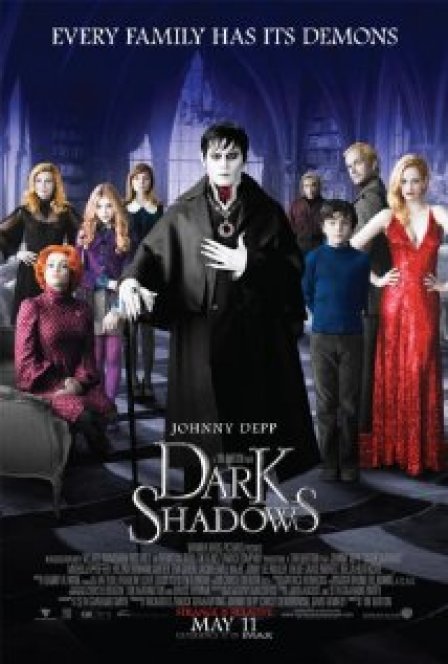By now, it should be clear that Tim Burton’s movies don’t mean a thing. The man is simply his own mini-institution, and he’s been able to deliver a pleasing and unbelievably successful brand of popular cinema mostly through the reimagining of older brands. People really like all his trademarks: the faux-gothic, Disneyland-ride mises-en-scène; the hyper-fake color scheme; the recognizable cultural touchstones; the special effects; the horrifying, entirely comedic violence; and, of course, the simple charms of Johnny Depp. It’s all there, every time, so there’s no point in asking why a filmmaker as seemingly talented as Burton long ago gave up trying to flesh out the characters in his increasingly indistinguishable movies. He is a showman with a limited but distinctive sensibility, a lightly gloomy cache of visuals. And he’s up to more of the same with Dark Shadows, another pop-goth camp-fest that’s so “Burton-esque” it’s basically a punchline.
The film’s plot, based off a 1960s soap opera of the same name, spins loosely around a character named Barnabus Collins (Johnny Depp), who was a rich and prominent New Englander of the 1700s until a jealous ex-lover (Eva Green as Angelique Bouchard), who happened to be a witch, murdered his true love and turned him into a vampire. Being a witch and not a vampire, Angelique couldn’t have vamped him with the traditional bite to the neck. We’re left to assume she invented some vampire spell during one of her late-night hovering-over-a-bubbling-cauldron sessions, but, as with most of Dark Shadows, the particulars are never made clear. In any case, Barnabus is chained to the inside of a casket and buried under the earth until 1972, when a team of electrical linemen dig him up and cut his chains, only to suffer the wrath of his vampire’s thirst. Satiated, Barnabus sets out acquainting himself with the 20th century — Burton-ized into a series of cheeky 70s references, mainly confined to floral-print mod dresses, lava lamps, and hippies — before facing off against the witch, who has survived the two centuries for the sole purpose of tormenting Barnabus upon his inevitable return.
Everything looks like an animatronic theme park ride as seen through a haze of pot smoke — Burton loves to add a blurry border to his computer-aided compositions in order to reinforce the point that nothing should be taken seriously. It shouldn’t, and that’s a consistent hindrance to enjoying the movie. But I can’t exactly not recommend Dark Shadows, because it seems to deliver exactly what Burton fans want: the beauty of Depp the goth teen idol, the over-the-top sexual confidence of Helena Bonham-Carter (as an alcoholic psychiatrist with a blood fetish), and a lot of well-balanced tableaux. As usual, Burton has little to no interest in what happens between his shots: he’s a shoddy editor, often cutting away from an interesting face (Depp’s or Bonham-Carter’s) in mid-sentence, presumably because he’s worried people will get bored if they have to wait too long for the next special effect. A Burton scene doesn’t move unless a computer or Depp’s hamming moves it for him. But that’s how he works, so does it matter? With Dark Shadows, you’ll get all the Burton you pay for.

